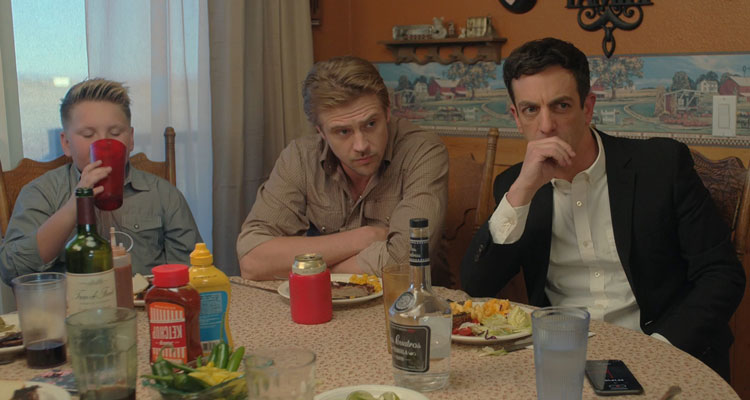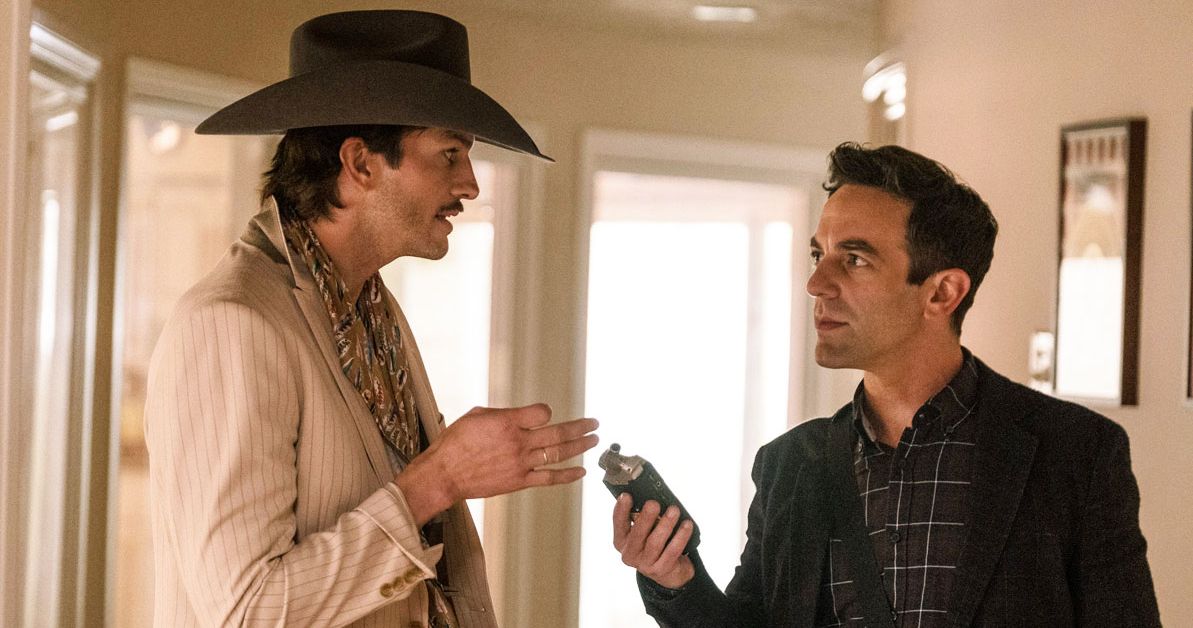The following contains spoilers for the film Vengeance, currently showing on Amazon Prime.
Brimming with cocksure political commentary, B. J. Novak’s directorial debut, Vengeance, strives to be many things simultaneously: a Twitter screed, a madcap detective story, a biting satire, a sitcom comedy, and an examination of our post-truth age. It succeeds in fits, primarily due to Novak’s overwrought yet ever-eloquent command of language. But it’s also bogged down by some eager-to-please jokes and its overall inability to marry its dynamic sociopolitical inquiries with nuanced, realistic characters. The ideas of the film are among the most thought-provoking to hit screens this year; unfortunately, the world-building and “cultural” depictions aren’t as multivalent and realized as the savvy monologues populating the script.
The film begins with Ben Manalowitz (Novak) conversing with John Mayer (ostensibly playing himself) on the rooftop of an NYC party. It’s a good place to start because one can immediately intuit that Novak, like his narcissistic character (an obvious approximal version of himself), is very much in his hipster element: cozily bantering with Mayer about women, infidelity, social media, and technology via a flurry of quick, wry quips. This setup is crucial as the rest of the film will consist of Ben outside of his safe, detached, entitled haven—or to put it in Twitter terms, outside of his bubble.
Inside the party, we meet Eloise (Issa Rae), who is Ben’s supervisor at NPR. Sitting across from Eloise, Ben pitches a flurry of inchoate ideas he has for a podcast. Once again, we’re witnessing Ben/BJ in his comfort zone—riffing on social trends. He mostly waxes philosophical about how our political divide is part and parcel of a greater, temporal divide: “America is divided by time. We don’t live in the moment anymore.”
According to Ben, social media and mobile technology have mediated our interactions – insofar as we rarely engage face to face or in the same memory. Everything is recorded, transmitted, uploaded, downloaded, and experienced via a delayed echo of the actual inciting moment. And this fragmentation of the real or lived experience, Ben posits, represents an alarming paradigm shift in our sense of interpersonal intimacy and connectivity. Our cultural divide is the byproduct of our technological divide.

Eloise strokes Ben’s/Novak’s ego by nodding along to this entire hypothesis, before offering some editorial feedback that becomes, in a way, the catalyst of the film. She implores him to leave the realm of the abstract and find the heart of the story – to escape his bubble and challenge himself. As Eloise puts it, “America is its people. That’s why it’s so f*cked up.”
Because the American populace is teeming with materialist impulses and rampant philistinism, it needs pulpy excess—the hyperbolic guns, murder, mystery, and conflict of a traditional dramatic narrative—to distract itself and to pay attention. Ben is therefore encouraged to search for the pulse, the “heartbeat” of the story. For as Eloise sees it, abstraction alone just doesn’t cut it when it comes to gaining America’s attention. It’s simply too “heady.”
Mirroring Eloise’s advice, Vengeance itself soon becomes a dramatic adventure as Ben soon finds himself on a solo journey into the heartland of America—searching for the heartbeat of a story. The setup leading Ben to Texas is a bit preposterous. Late one night, while lying in bed with a routine hookup (an anonymous fling whose name Ben tellingly forgets when she shows up), Ben receives a phone call from Ty Shaw (Boyd Holbrook). Ty is the brother of Abilene, yet another girl Ben supposedly had a brief, casual fling with in the semi-recent past. Ben can barely remember Abilene, illustrating just how flimsy and aimless his life currently is. But as Ty informs Ben that Abilene had been found dead and entreats him to attend the funeral, Ben reluctantly gives in.
During this phone conversation, the film’s intermittent and incongruous slapstick tone begins to seep in. We are forced to witness an audience-insulting level of persuasion that ends with Ben saying, “I’ll be there in spirit.” Of course, Ty mistakes this for a reference to Spirit Airlines, and Ben, unwilling to correct the stranger, concedes to the verbal miscue, packing his bags for Texas. First off, the pun is dumb and gimmicky. Second, why dumb down the material for cheap laughs? Novak could have easily illustrated Ben’s narcissistic need for podcast material as the inciting impetus for his impulsive decision to fly to a rural Texas funeral to attend the funeral of a girl he slept with but can barely remember. Instead, he relies on cheap humor.
Once Ben steps foot in Texas, Novak’s caricaturing reaches a fever pitch. The Blue State is teeming with stereotypes. Thrown into a den of broadly-delineated country bumpkins, Ben’s entire sojourn in Texas becomes a nonstop barrage of hijinks and shenanigans. It is a classic “fish out of water” scenario—a coastal elite moseying around and eating Whataburger among country folk. Contrary to the overarching agenda of Novak’s screenplay (to discover the simpleton humanism and latent sophistication of provincial Texans), the depictions of the local yokels onscreen are far from multifaceted or flattering. Just take Ben’s first family dinner as a prime example. With his tape recorder at the ready, we are forced to listen to a granny give a long Alamo speech, sympathize with a scared pre-teen’s boy to sleep with a loaded Glock, and hear tautological arguments for the supremacy of Whataburger: “It’s right there!”

The entire milieu amplifies into a broad, unvarnished caricature of itself—and yet, we are also summoned to empathize with its cardboard stereotypes, making the material that much more difficult to digest. Novack makes it certain that we aren’t merely in Texas—we are in back-country Texas. To get this point across, his screenplay puts Ty to task: “Houston’s another country. Dallas ain’t Texas. Abilene is thee hours from Dallas. And we’re five hours from Abilene. This is the most wretched place on earth, and I’ll never leave.” Bewildered by this onslaught of hyper-localized, geo-cultural commentary, Ben retorts: “That’s how I feel about Twitter.”
Though played for comedy, this line encapsulates the real enemy in Vengeance: The Internet. Forming the bedrock of disinformation and conspiratorial mania, social media looms in the background of every conflict. It affects not only Ben, but also Abilene’s siblings—Paris (Isabella Amara), Kansas City (Dove Cameron), and El Stupido (Elli Abrams Beckel)—with whom Ben gradually bonds while staying in their home. Throughout his stay, Ben records every interaction for his podcast—impudently placing his recorder on the table during family meals, holding it up to strangers as they speak, and carrying it with him to bars and rodeos. Given that Ben already ranted about modern technology as fragmenting our existence and stripping us of being present, this barrier, the tape recorder, becomes a key aspect of the film’s primary theme.
The impulse to record slowly becomes synonymous with heresy. The act of recording also becomes a key tool for achieving vengeance/seeking justice – insofar as one must retrace steps and map out the evidence. However, Ben’s journey toward this epiphany requires that he find catharsis via jadedness. He spends the entire time in Texas recording everything, only to learn that this impulse was the primary culprit of his emptiness – obfuscating his reality, distorting his hope for human connection and clarity.

One of the prime suspects Ben records is the enigmatic Quinten Sellers (Ashton Kutcher). Quinten is a mystical/free-spirited record producer who recorded Abby’s songs before her death, and his heady asides take on rich, philosophical depth. Oddly enough, Quinten seems to be representative of the devil, and yet also a guru of enlightened aphorisms—a messenger of the deeper truth. He offers Ben much to ruminate upon. In one cryptic yet poignant monologue, Sellers waxes poetic about silence and sound, noting how sound marks the origin in the universe and everything after being an echo of tumultuous translation:
“Everyone agrees that the universe started with a sound. When you sing, I want you to think about how you are making the record of your time here on earth. Nobody writes anything; all we do is translate. Just listen. Even to the silence.”
For Sellers, capturing the essence of lived experience is the most important thing in life. As a music producer, his modus operandi is sonic/musical. But his definition of recording is much different than Ben’s definition. Music is much less of a recording of the moment, and more of a channeling of the moment. It serves as a conduit for heightening one’s presence. Personally, the fact that Ben/Novack never reconciles this possibility for writing feels like a failure of imagination. Nevertheless, through a video recording of Sellers speaking to Abby while in the recording booth, we hear a sermon on the role of art as an intersection of the spiritual, the individual, and the temporal:
“When you sing, I want you to think about how you are making the record of your time here on earth.”
The artist’s role, in Seller’s eyes, is to record the sound of the current age. And after his meetup with Sellers, Ben does just that. Replicating a fictional version of Serial meets This American Life, Ben spirals into an investigative web of intrigue. Quentin gifts ben a memory stick with a video of Abby performing, which he watches and listens to repeatedly, mulling over potential clues. He also begins to follow various leads, confronting a local named Sancholo outside of a bar, who offers an alibi of being away in Tulsa the night of Abby’s death and meeting with various law enforcement (local cops, border cops, highway cops, etc.).

During his journalistic search, Ben becomes dizzied by the elusiveness of truth. This allows him a prime segue to reflect on the modern pathology of conspiratorial America:
“The problem isn’t that people aren’t smart; the problem is they are. People can sense the truth, but they are grasping at facts.”
For Ben, conspiracies are the recourse of individuals sensing something isn’t right and grasping for closure. Unfortunately, because the truth is too hard to accept, or too sealed behind closed doors, the conscience decides to shield itself by making stuff up. In a nutshell, contemporary life is both too intelligent and intellectually creative for its own good. Without any recourse or avenue, ideas fester and mutate into fabrications. Our collective impulse smells truth, but we lack access to facts that might ground it.
One reason the truth is so difficult to parse is the hierarchization and bureaucratization of society. Ben is mocked by this firsthand when he tries to consult with local law enforcement, who each defer responsibility, claiming Abby’s corpse wasn’t found in their jurisdiction. Ben begins to suspect Abby’s murder location was too fortuitous. The murderer, representing an agent of conspiratorial disruption, had used a liminal/grey area on purpose—using the boundaries of bureaucratic jurisdiction to get away with murder. Ultimately, Ben returns to the site where Abby’s body was found—near the oil pumps.

In a sequence that reminded me of a lightweight version of the finale of Blood Meridian, Ben runs into Quentin Sellers again in a tent. He begins to tie everything together. Spotting packaged drugs and a girl overdosing, Ben calls out Quentin, who in turn confesses to everything, stating that the truth won’t matter anyways – noting that the story can be spun into a million different yarns. Defeated by this stance, Ben concedes his witch hunt and takes matters into his own hands—shooting Sellers then and there, just as The Kid murders The Judge in Blood Meridian. The moment, on a thematic level, appears to be emblematic of how to deal with a post-truth world. When lies, deflections, equivocations, and prevarication reign supreme, justice must become corporeal—rooted in hard, physical punishment.
Ben is so convinced of this newfound moral bent that he deletes his recording of his confrontation with Sellers during Vengeance’s final scene, thereby rendering the truths he’d unearthed both moot and meaningless. We’re supposed to believe this gesture is a courageous and noble one: Ben is living up to his mantra that what truly matters is the lived story and real experiences. Contrary to the world of artistry and coastal elitism, he’s come to see the value of Texan-style living: learning the values of familial loyalty and heartfelt kinship.
It is also intriguing that Ben hears Sharon’s reflections again—“Life’s all regrets. Move from one regret to the next”—while leaning on a NY subway window as the film fades to black. He seems to find solace and guidance in these words. Having come to believe that “we trade in our entire lives for the little pieces that get recorded of us,” Ben wants us to believe that he’s eradicated the artistic impulse from himself entirely. He has ostensibly become an experiential being – one who lives by his heart, and who lives for relationships. This just feels like a bunch of hubristic baloney – self-congratulatory nonsense that works metaphorically/theoretically but holds zero credibility.
The problem is Ben’s story—uncovering the loopholes and hypocrisies and ambiguities of our post-truth stance—is not gratuitous. It isn’t just endless fodder or distraction for the masses. There is a difference between what is being recorded as a substitute for intimacy and what is being recorded to gain access to a deeper truth. Returning to NYC, we’re led to believe that Ben’s existential crisis will require him to quit his lines of professional—as a journalist and a podcaster. How else can he reconcile his sudden disavowal of recorded communication? What’s going to take the place of this outlet—friends and family? Even our Texas caricatures were mired in tech and mythology, dreaming of celebrity, and citing literature. Thus, if anything, Ben’s disengagement feels like nothing more than indulgent, nihilistic resignation. A fleeting moment of self-flattery. We all know he’ll be scrambling for the recorder again by morning.


